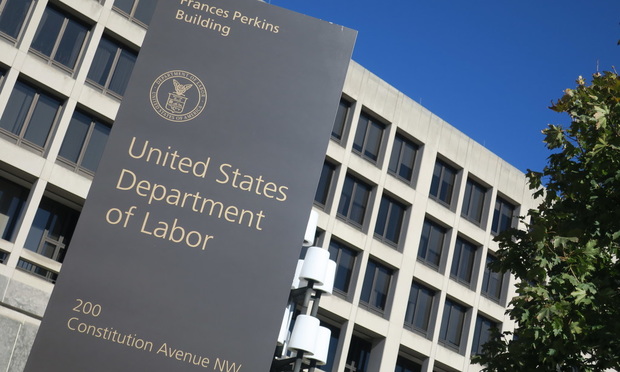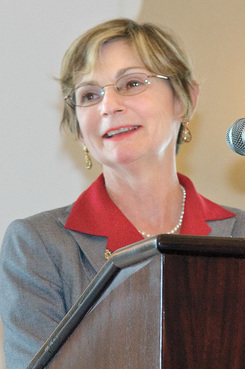Divided Fifth Circuit Scraps Obama-Era 'Fiduciary Rule'
The U.S. Court of Appeals for the Fifth Circuit on Thursday divided 2-1 in striking down the Obama-era U.S. Labor Department's fiduciary rule. The regulations, targeting conflicts of interest in the retirement-savings industry, expanded the definition of "fiduciary." Business groups challenged the rule.
March 15, 2018 at 06:43 PM
6 minute read
 U.S. Labor Department headquarters in Washington, D.C. Credit: Mike Scarcella / NLJ
U.S. Labor Department headquarters in Washington, D.C. Credit: Mike Scarcella / NLJ
The U.S. Court of Appeals for the Fifth Circuit, voting 2-1, on Thursday vacated the U.S. Labor Department's fiduciary rule.
The challengers in the Fifth Circuit case included the U.S. Chamber of Commerce, the Securities Industry and Financial Markets Association and the Financial Services Institute. The ruling comes one day after Labor Department won a case in the U.S. Court of Appeals for the Tenth Circuit that was brought by Market Synergy Group, an insurance distributor.
The Fifth Circuit struck down the entirety of the fiduciary rule, which had expanded the definition of “fiduciary” in an attempt to confront conflicts of interest in the retirement-savings industry.
Labor's next move is to decide whether to ask the full appeals court to rehear the dispute, or take the case to the U.S. Supreme Court. The U.S. Court of Appeals for the D.C. Circuit still has an active case, one that was on hold until the Fifth Circuit ruled. The Washington court will not be bound by how the Fifth Circuit ruled.
Judge Edith Jones, writing for the majority in the Fifth Circuit's ruling, said Labor's “new definition dispenses with the 'regular basis' and 'primary basis' criteria used in the regulation for the past 40 years.”
 Edith Jones
Edith Jones“Consequently, it encompasses virtually all financial and insurance professionals who do business with ERISA plans and IRA holders. Stockbrokers and insurance salespeople, for instance, are exposed to regulations including the prohibited transaction rules,” Jones wrote. “The newcomers are thus barred, without an exemption, from being paid whatever transaction-based commissions and brokerage fees have been standard in their industry segments because those types of compensation are now deemed a conflict of interest.”
Jones, joined by Judge Edith Clement, said in the ruling: “DOL has made no secret of its intent to transform the trillion-dollar market for IRA investments, annuities and insurance products, and to regulate in a new way the thousands of people and organizations working in that market.”
Large portions of the financial services and insurance industries, Jones wrote, “have been 'woke' by the Fiduciary Rule and BIC Exemption. DOL utilized two transformative devices: it reinterpreted the 40-year-old term 'investment advice fiduciary' and exploited an exemption provision into a comprehensive regulatory framework.”
The court wrote in the ruling that President Donald Trump has directed Labor “to re-examine the Fiduciary Rule and prepare an updated economic and legal analysis” of its provisions, noting that the effective date of some provisions has been extended to July 1, 2019.
“The case, however, is not moot,” the majority ruling states. The fiduciary rule, the court said, “has already spawned significant market consequences, including the withdrawal of several major companies, including MetLife, AIG and Merrill Lynch from some segments of the brokerage and retirement investor market. Companies like Edward Jones and State Farm have limited the investment products that can be sold to retirement investors.”
The ruling continued: “Confusion abounds—how, for instance, does a company wishing to comply with the BICE exemption document and prove that its salesman fostered the 'best interests' of the individual retirement investor client? The technological costs and difficulty of compliance compound the inherent complexity of the new regulations.”
Labor's rule also “contradicts the text of the 'investment advice fiduciary' provision and contemporary understandings of its language,” the ruling states.
The judge voting in favor of Labor's fiduciary rule, Chief Judge Carl Stewart, wrote in his dissent, that: “I conclude that the DOL acted well within the confines set by Congress in implementing the challenged regulatory package, and said package should be maintained so long as the agency's interpretation is reasonable.”
“DOL has acted within its delegated authority to regulate financial service providers in the retirement investment industry—which it has done since ERISA was enacted—and has utilized its broad exemption authority to create conditional exemptions on new investment-advice fiduciaries,” Stewart wrote. “That the DOL has extended its regulatory reach to cover more investment-advice fiduciaries and to impose additional conditions on conflicted transactions neither requires nor lends to the panel majority's conclusion that it has acted contrary to Congress' directive.”
Micah Hauptman, financial services counsel for the Consumer Federation of America, told ThinkAdvisor that the “case was wrongly decided. The industry opponents went forum shopping and finally found a court that was willing to buy in to their bogus arguments. This is a sad day for retirement savers.”
The opinion, Hauptman added, “is extreme by any measure. It strikes at the essence of the DOL's authority to protect retirement savers under ERISA. It's not only an attack on the rule, it's an attack on the agency.”
Gibson, Dunn & Crutcher partner Eugene Scalia in Washington argued for the challengers in the Fifth Circuit. Business and trade advocates that mounted the mounted the legal challenge—including the Chamber, Financial Services Roundtable and the Securities Industry and Financial Markets Association—heralded the appeals court decision.
“The court has ruled on the side of America's retirement savers, preserving access to affordable financial advice,” the statement said. “Our organizations have long supported the development of a best interest standard of care and the Securities and Exchange Commission should now take the lead on a clear, consistent, and workable standard that does not limit choice for investors.”
The Fifth Circuit's decision is posted below:
Read more:
DOL Wins Fiduciary Challenge in Tenth Circuit Appeals Court
Kirkland Partner, Trump's Pick for Labor Solicitor, Reveals Pay, Clients
SEC Fiduciary Rule Likely to Address Broker, Advisor Titles: Peirce
U.S. Labor Dept. Delays Start of Fiduciary Rule
Originally published by ThinkAdvisor. All rights reserved. This material may not be published, broadcast, rewritten, or redistributed. Contact Melanie Waddell at [email protected].
This content has been archived. It is available through our partners, LexisNexis® and Bloomberg Law.
To view this content, please continue to their sites.
Not a Lexis Subscriber?
Subscribe Now
Not a Bloomberg Law Subscriber?
Subscribe Now
NOT FOR REPRINT
© 2025 ALM Global, LLC, All Rights Reserved. Request academic re-use from www.copyright.com. All other uses, submit a request to [email protected]. For more information visit Asset & Logo Licensing.
You Might Like
View All
Brownstein Adds Former Interior Secretary, Offering 'Strategic Counsel' During New Trump Term
2 minute read
Weil, Loading Up on More Regulatory Talent, Adds SEC Asset Management Co-Chief
3 minute read
FTC Sues PepsiCo for Alleged Price Break to Big-Box Retailer, Incurs Holyoak's Wrath
5 minute read
Supreme Court Will Hear Religious Parents' Bid to Opt Out of LGBTQ-Themed School Books
Trending Stories
- 1Paul Hastings, Recruiting From Davis Polk, Continues Finance Practice Build
- 2Chancery: Common Stock Worthless in 'Jacobson v. Akademos' and Transaction Was Entirely Fair
- 3'We Neither Like Nor Dislike the Fifth Circuit'
- 4Local Boutique Expands Significantly, Hiring Litigator Who Won $63M Verdict Against City of Miami Commissioner
- 5Senior Associates' Billing Rates See The Biggest Jump
Who Got The Work
J. Brugh Lower of Gibbons has entered an appearance for industrial equipment supplier Devco Corporation in a pending trademark infringement lawsuit. The suit, accusing the defendant of selling knock-off Graco products, was filed Dec. 18 in New Jersey District Court by Rivkin Radler on behalf of Graco Inc. and Graco Minnesota. The case, assigned to U.S. District Judge Zahid N. Quraishi, is 3:24-cv-11294, Graco Inc. et al v. Devco Corporation.
Who Got The Work
Rebecca Maller-Stein and Kent A. Yalowitz of Arnold & Porter Kaye Scholer have entered their appearances for Hanaco Venture Capital and its executives, Lior Prosor and David Frankel, in a pending securities lawsuit. The action, filed on Dec. 24 in New York Southern District Court by Zell, Aron & Co. on behalf of Goldeneye Advisors, accuses the defendants of negligently and fraudulently managing the plaintiff's $1 million investment. The case, assigned to U.S. District Judge Vernon S. Broderick, is 1:24-cv-09918, Goldeneye Advisors, LLC v. Hanaco Venture Capital, Ltd. et al.
Who Got The Work
Attorneys from A&O Shearman has stepped in as defense counsel for Toronto-Dominion Bank and other defendants in a pending securities class action. The suit, filed Dec. 11 in New York Southern District Court by Bleichmar Fonti & Auld, accuses the defendants of concealing the bank's 'pervasive' deficiencies in regards to its compliance with the Bank Secrecy Act and the quality of its anti-money laundering controls. The case, assigned to U.S. District Judge Arun Subramanian, is 1:24-cv-09445, Gonzalez v. The Toronto-Dominion Bank et al.
Who Got The Work
Crown Castle International, a Pennsylvania company providing shared communications infrastructure, has turned to Luke D. Wolf of Gordon Rees Scully Mansukhani to fend off a pending breach-of-contract lawsuit. The court action, filed Nov. 25 in Michigan Eastern District Court by Hooper Hathaway PC on behalf of The Town Residences LLC, accuses Crown Castle of failing to transfer approximately $30,000 in utility payments from T-Mobile in breach of a roof-top lease and assignment agreement. The case, assigned to U.S. District Judge Susan K. Declercq, is 2:24-cv-13131, The Town Residences LLC v. T-Mobile US, Inc. et al.
Who Got The Work
Wilfred P. Coronato and Daniel M. Schwartz of McCarter & English have stepped in as defense counsel to Electrolux Home Products Inc. in a pending product liability lawsuit. The court action, filed Nov. 26 in New York Eastern District Court by Poulos Lopiccolo PC and Nagel Rice LLP on behalf of David Stern, alleges that the defendant's refrigerators’ drawers and shelving repeatedly break and fall apart within months after purchase. The case, assigned to U.S. District Judge Joan M. Azrack, is 2:24-cv-08204, Stern v. Electrolux Home Products, Inc.










